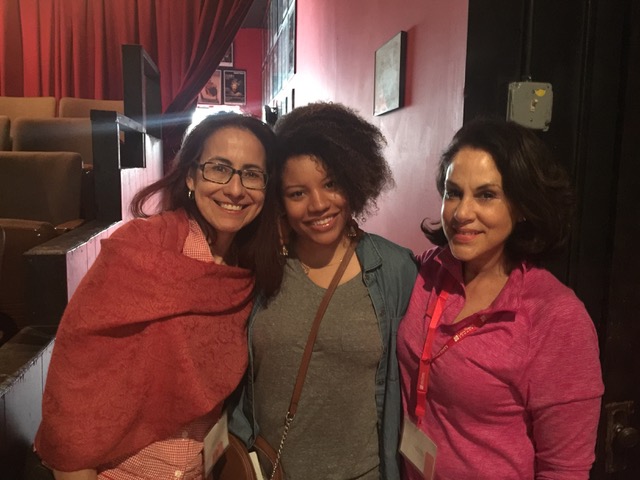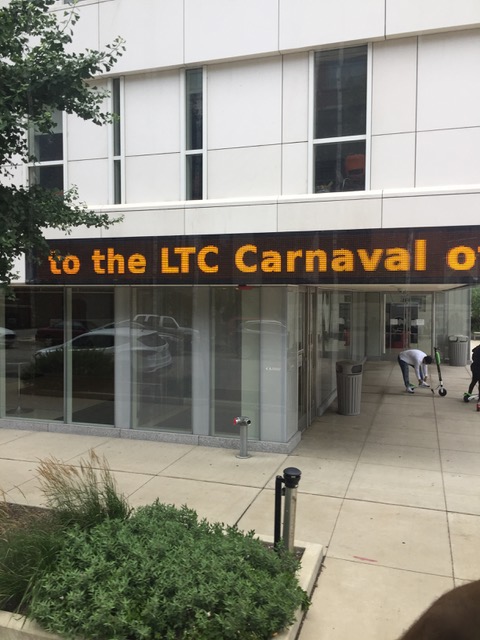The Carnaval Shines a Spotlight on Latinx Theatre!
by Olga Sánchez Saltveit, Doctoral candidate, Department of Theatre Arts
The Latinx Theatre Commons’ 2018 Carnaval of New Latinx Work showcased theatre makers, including playwrights, directors, and dramaturges from all over the U.S., as well as over 30 Chicago-based actors in a groundbreaking gathering at DePaul University from July 19-21, 2018. Six plays, selected from 130 submissions, were presented in a series of innovative readings that reflected the diversity and excellence of Latinx theatre-making. The unique approach accompanied each reading with a presentation from a team of Latinx scenic, lighting, costume, and sound designers who introduced their aesthetic approaches while allowing audiences to better envision how each play might look and sound. The Carnaval welcomed audiences from all over the country, including decision-makers at major theatres with the influence to engage these Latinx artists and in doing so, introduce them to a broader field of the American theatre.
This commitment to highlighting the work of Latinx theatre-makers reflects the mission of the Latinx Theatre Commons, described on its website as “a national movement that uses a commons-based approach to transform the narrative of the American theatre, to amplify the visibility of Latinx performance making, and to champion equity through advocacy, art making, convening, and scholarship.” This is essential because for too long Latinx culture and history has been misrepresented in the mainstream. In the hands of artists who have no direct understanding of Latinx cultural experiences, plays are easily misinterpreted, recreating harmful stereotypes, and misleading public opinion.

Questions of representation currently loom large in the American theatre, as the field acknowledges that many marginalized communities have been subjected to centuries of misrepresentation by a dominant culture that creates narratives which invariably justify and uphold the status quo of oppression. It has become imperative that works expressing minority experiences be placed in the care of artists who understand the truth behind those stories. The Carnaval strives to reclaim the authentic Latinx voice on stage by showcasing professional Latinx theatre makers, and further, to stake a claim on flagship stages of the American theatre, where the work can be served by greater resources and reach audiences with influence in the public sphere.
The 2018 LTC Carnaval served as an incubator for the new plays. The creative teams engaged in workshops which took the form of visioning sessions, rehearsals, rewrites, and more rehearsals during the week leading up to the public readings, which featured the following scripts:
My Father’s Keeper, by Guadalís del Carmen, about a gay man from the Dominican Republic who hides his true sexual orientation from his wife and children. His death reveals his truth, as well as his struggles being a dark-skinned Latino in the U.S., an experience shared by his son. Richard & Jane & Dick & Sally, by Noah Diaz, embodies the classic children’s schoolbooks, except now the children are all grown up and facing mortality. Killing of a Gentleman Defender, by Carlos Murillo, is a self-reflective work about a playwright asked to work with “at-risk” youth to create a performance for the benefit of a large theatre company. He struggles between the demands of the prestigious assignment and his desire to honor the trauma of these youth’s experiences with gun violence. Shoe, by Marisela Treviño Orta, is the story of a dutiful daughter trapped in rural Texas by her mother’s hypochondria. When her younger sister gets pregnant, life threatens to keep this woman trapped forever. Milton, MI, by Paz Pardo, takes place in the world of a small liberal arts college, where the arrival of a young writer pushes older poets to reflect on their careers and their marriage. Our Dear Dead Drug Lord, by Alexis Scheer, imagines a high school club of girls who venerate Pablo Escobar in their tree house. This last play was hilariously chilling.

The Carnaval’s theme, Conexión, was manifest in the activities that surrounded the play readings and presentations. All attendees received “passports” encouraging them to meet new people and exchange stories and contact information. Additionally, there were field trips to local Latinx-identified theatre companies including Teatro Vista, Urban Theatre, Aguijón Theatre, and Teatro Vista, organized by Chicago’s Association for Latinx Theatre Artists (ALTA). Carnaval illuminated Latinx theatre-making for the field at large and strengthened the network of Latinx theatre makers. Many thanks to the research support provided by CLLAS, which allowed me to attend this joyful, historic event!
—Olga Sánchez Saltveit is a graduate student member of the CLLAS Executive Board. and a PhD candidate in the Department of Theatre Arts. She received a 2018 CLLAS Graduate Student Research Grant in support of her research
